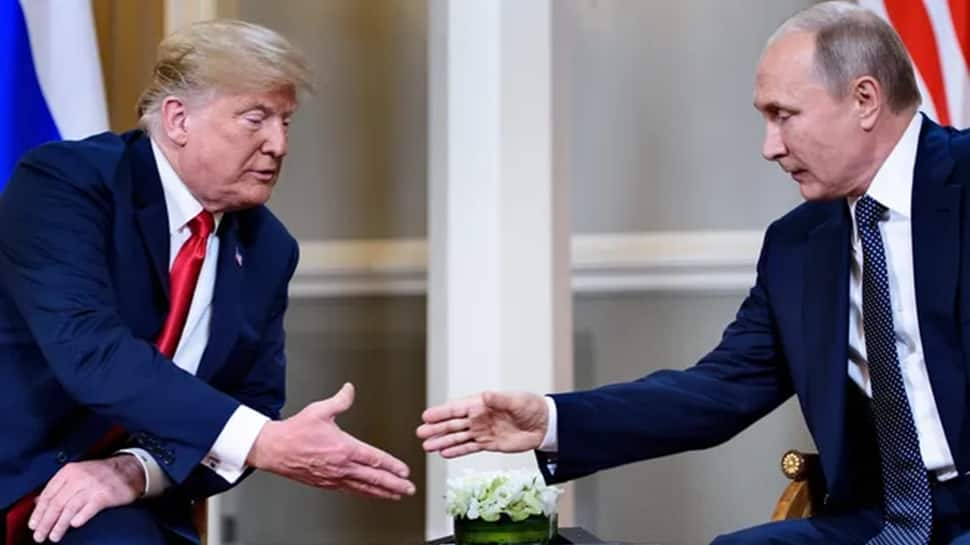 |
|
The article centers around former US President Donald Trump's recent claims regarding his communication with Russian President Vladimir Putin concerning the ongoing conflict in Ukraine. Trump asserts that he has engaged in telephone conversations with Putin in an attempt to negotiate a resolution to the crisis. The exact number of these conversations remains undisclosed, with Trump stating, 'I'd better not say.' This evasiveness adds a layer of intrigue to his claims, raising questions about the nature and extent of these purported discussions. However, Trump's central message is clear: he believes Putin is concerned about the escalating death toll in the war and desires an end to the bloodshed. This assertion directly contradicts the prevailing narrative surrounding Putin's resolve and the perceived lack of concern for human life within the Russian military’s actions.
Trump's characterization of Putin's motivations is particularly striking. He portrays Putin as someone who cares about the loss of life, emphasizing the 'young, young, beautiful people' dying in the conflict. This portrayal stands in contrast to the often-depicted image of Putin as a ruthless and calculating leader, unconcerned with civilian casualties. By framing Putin in a seemingly more empathetic light, Trump attempts to humanize the Russian president and potentially bolster the credibility of his claims regarding ongoing negotiations. However, the lack of concrete evidence to support Trump's assertions leaves room for skepticism. The absence of independent verification of these conversations weakens the weight of his statements, leaving the public to rely on his word alone.
Beyond the reported conversations with Putin, Trump further asserts that the Ukraine war 'never would have happened' if he were still president. This statement is a clear dig at his successor, President Joe Biden, whom Trump describes as an 'embarrassment' to the nation for his handling of the situation. The claim itself is unsubstantiated and ignores the complex geopolitical factors that contributed to the conflict's eruption. It serves primarily as a rhetorical tool, reinforcing Trump's narrative of his own superior competence and leadership in foreign policy. The absence of supporting evidence, combined with the inherent difficulty of definitively proving a counterfactual scenario, renders this claim highly contentious and subject to considerable debate.
Further fueling speculation, Trump mentions having a 'concrete plan' to resolve the crisis. While he expresses a desire for a swift resolution, he offers no details of this plan. This vagueness prevents any meaningful assessment of its feasibility or potential effectiveness. The lack of transparency surrounding this alleged plan raises questions about its substance and intentions. Without any concrete information, it remains impossible to judge the viability or merit of Trump's proposed solution to the conflict.
The article also highlights a proposed deal between Trump and Ukrainian President Volodymyr Zelenskyy involving access to rare-earth minerals and gas in exchange for security guarantees. This proposal, valued at $500 million, further underscores Trump's stated interest in negotiating a resolution to the conflict. However, the details of this proposal are scarce, and its feasibility and ethical implications remain unclear. The potential economic benefits for the United States and the security implications for Ukraine are subject to intense scrutiny and debate. The lack of concrete details makes it difficult to evaluate the merits or potential drawbacks of this proposed deal. Is it a genuine attempt at peacemaking or a transactional approach driven primarily by economic interests?
In conclusion, the article presents a complex and potentially misleading picture of Trump's alleged role in trying to mediate the Ukraine conflict. While his claims of communicating with Putin and having a plan to end the war are undeniably attention-grabbing, the lack of supporting evidence and verifiable details raises serious questions about the credibility of these assertions. The absence of independent confirmation casts doubt on the validity of Trump's narrative, leaving the public to grapple with a largely unsubstantiated account of potential diplomatic efforts. The article serves as a reminder of the importance of critically evaluating information, especially in the context of high-stakes geopolitical events, where misinformation and biased narratives can easily proliferate.
Source: Trump Reveals He Has Spoken To Putin In Bid To Negotiate Russia-Ukraine Crisis
